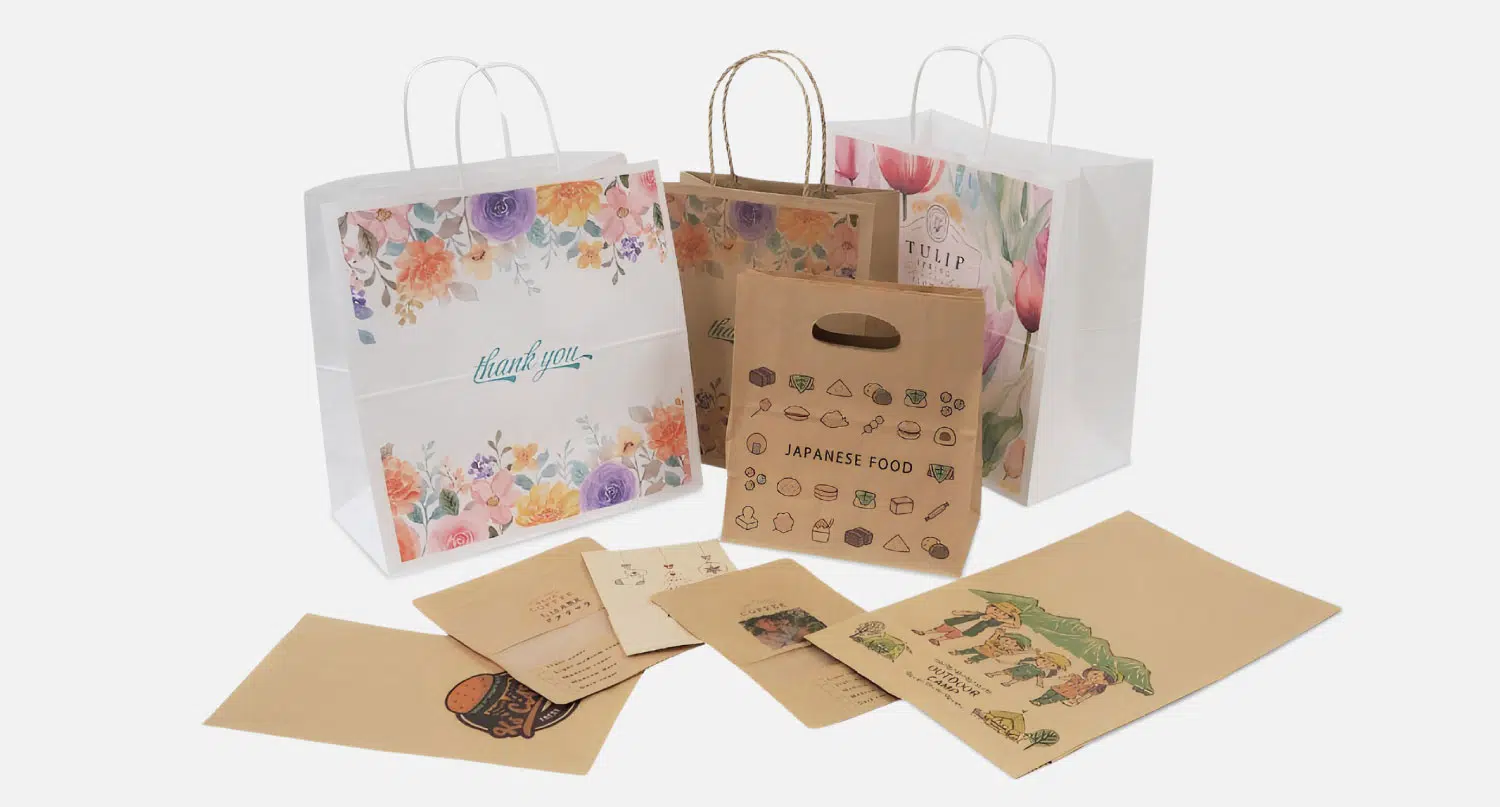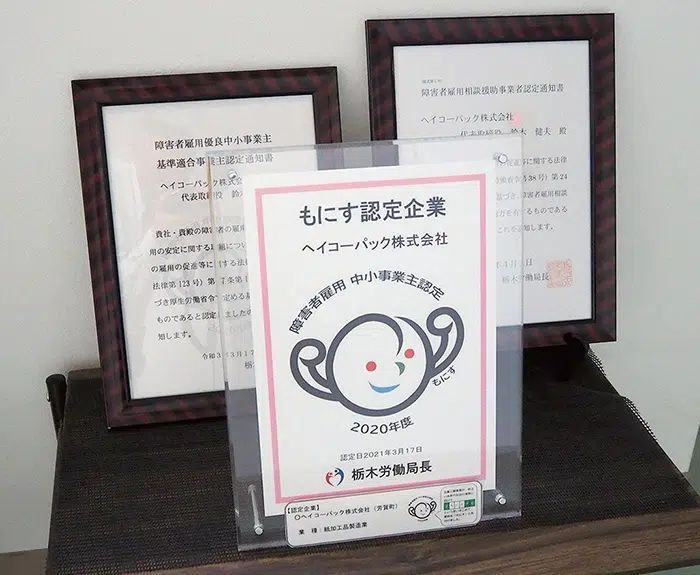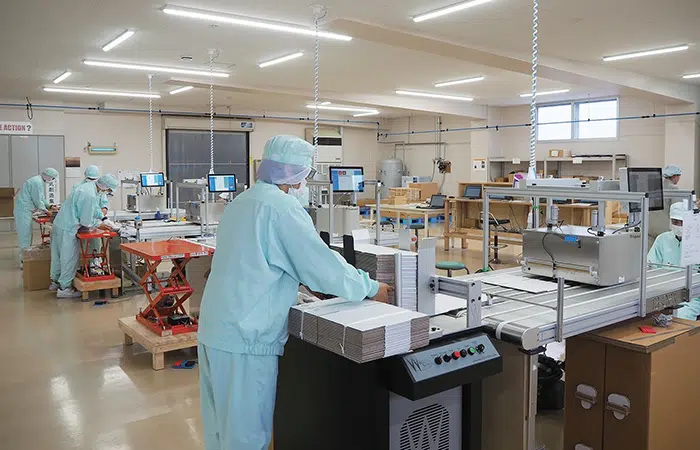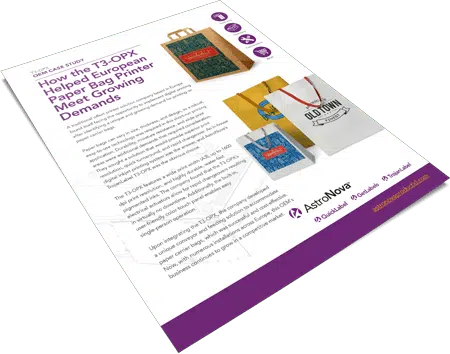
In 2022, Heiko Pack Co., Ltd. (Japan) launched an on-demand printing service for small-lot, short-delivery paper bags and packaging materials using a TrojanLabel T3-OPX, which can print directly onto three-dimensional objects made into bags and boxes. Starting with one T3-OPX, the company has now expanded to four machines, making on-demand printing a growing pillar of its business. This expansion aligns with the company’s long-standing commitment to employing people with disabilities.
Heiko Pack was founded in 1963 as a plastic bag processor. It began manufacturing paper bags in 1970, and now its main business is the manufacture and sale of paper bags. The company has 30 processing machines, including a rotary bag-making machine, one offset printing machine, one gravure printing machine, and five flexographic printing machines. It mainly produces large lots, with a minimum order of 10,000 pieces. 60% of orders are ready-made products sold in stores, and 80% are shipped to Shimojima, a packaging materials retailer.
Creating a workplace where people with disabilities can thrive
The company has 170 employees. Of these, 40 are disabled, roughly one in four. Heiko President Takeo Suzuki says, “The Haga Factory (Haga-machi, Haga-gun, Tochigi Prefecture) was built 50 years ago, and I heard that they started employing people with disabilities a few years later. The number has gradually increased since 30 years ago.”
The company’s employment of people with disabilities is more about “strengthening the workforce” than welfare. When there are groups of four people on one line, they are active in the inspection and packaging processes. They are highly motivated, and many of them want to work at a site directly involved in manufacturing. At the site, they create an environment that is easy for people with disabilities to work in, such as color-coding signs. “We need to teach disabled people how to do their jobs more carefully and patiently. It is also important to create a system that takes into account the characteristics of each disability, and this process leads to broadening the scope of humanity. Employees with disabilities can work faster, and they can sometimes teach able-bodied employees. There are many benefits for the company, so we want them to work for us for as long as possible.”

In 2021, the company received the “Monisu Certification,” which recognizes efforts to employ people with disabilities.
The T3-OPX is a printer that enables printing on a wide variety of materials of various thicknesses. It has a function to automatically adjust the height of the printer head and can handle a wide range of thicknesses, from thick materials such as pre-packaged cardboard to extremely thin materials. The ink used is water-based, which is compatible with natural substrates.
President Suzuki initially introduced the service anticipating the demand for small-lot packaging materials. Demand gradually increased, but orders began to grow dramatically after collaboration with online shops, when Shimojima, a major client, began a service for producing original packaging on its online shop. This service allowed customers to order paper bags and boxes with original designs and names, and by establishing a production system and know-how for such online shops, requests began to come in from other online shops and mail-order businesses.
What was once around 20 orders a week has now grown to 10 a day, then 20. This year’s peak season has seen it grow to as many as 100 orders per day.
This service allowed customers to order paper bags and boxes with original designs and names … What was once around 20 orders a week has now grown to 10 a day, then 20. This year’s peak season has seen it grow to as many as 100 orders per day.
In February of this year, the company expanded its printer lines. They changed the floor where the printers are installed to make it easier for the disabled employees in charge of production to work, allowing them to work in a larger space. Currently, there are four printer lines on the same floor.

There are about 10 people on the production line. Because orders are placed through the online shop, the number of orders can fluctuate, so the number of staff can be increased or decreased easily. During busy periods, people from other departments rush to help out.
What made this setup possible was the high operability of the T3-OPX. Once the printer was set up, all that was required was to place the substrate on the transport section and stack it. “Once the data is input into the printer, the rest is easy. It’s a very easy-to-use machine. We moved to a larger floor in February this year because the existing space became too small due to an increase in orders. The employees involved in the work are also stressed, so the most important thing is the mental health of everyone. We want them to enjoy working here for a long time.”
“Once the data is input into the printer, the rest is easy. It’s a very easy-to-use machine.”
The lot size per order ranges from 1 piece to 3,000 pieces. We handle the substrates for the items offered by the online shop, and we always have dozens of different substrates in stock. The characteristics of the substrates vary widely depending on the shape and material. For substrates with uneven surfaces, such as gusseted paper bags, we use creative tools to print on them. Online shop users range from individuals to businesses, from general consumers who use online flea market services to ship products, to small shops, restaurants, farmers selling directly from the source, and event departments of large corporations.
Packaging materials are priced high, and profit margins are getting tighter every year. President Suzuki read into this market trend and focused on the demand for small lots, which could potentially increase added value. “We want to develop our small-lot digital printing business into one of our main pillars. The small-lot packaging materials we offer at our online store are not a replacement for existing demand but rather a new market that strikes a balance between the quality that can be achieved with the T3-OPX and the needs of our users. It may be a niche business, but we feel it has great potential.”
Currently, four T3-OPXs are in operation, mainly to meet online shop demand. Hygiene is thoroughly managed, including the wearing of headgear by workers, because these four machines print packaging materials for food products. In the future, they will go one step further and set up a new line for food packaging on a separate floor, which has even higher demands.
In the future, they will go one step further and set up a new line for food packaging on a separate floor, which has even higher demands.
President Suzuki said, “If the volume of distribution decreases due to the 2024 logistics problem, it will also affect the demand for packaging materials. We need to determine how this market will change together with our customers. Although we have limited equipment that we can invest in, we need to study market changes and take on new challenges.” Looking at the business environment his company is in, he has high hopes for the T3-OPX as the next step to further increase added value.
Original Article published by Newprinet.co.jp.




